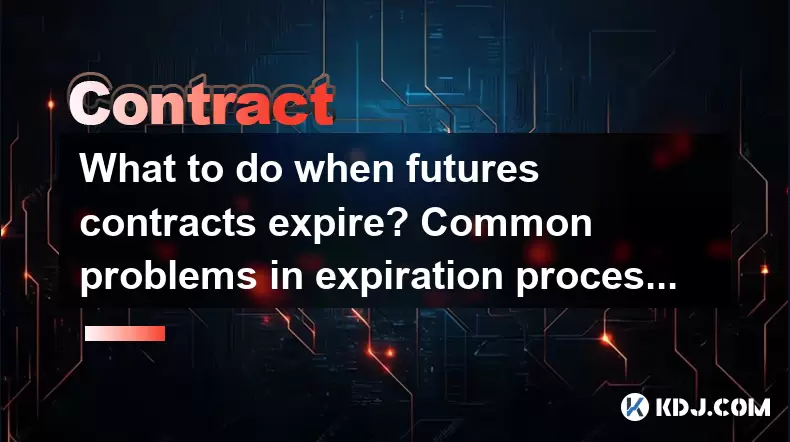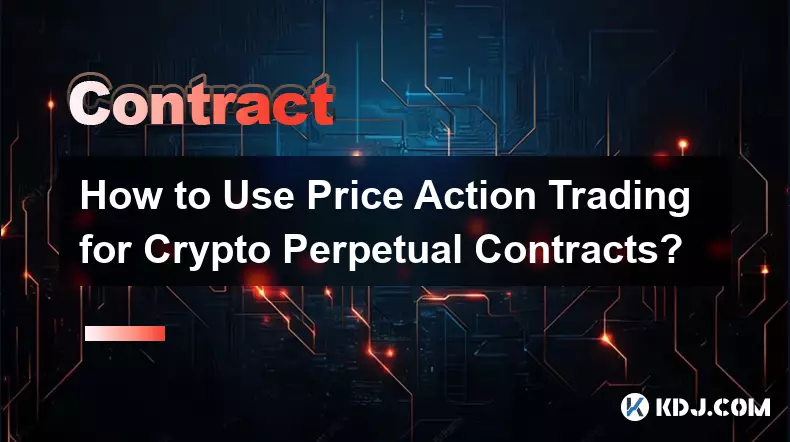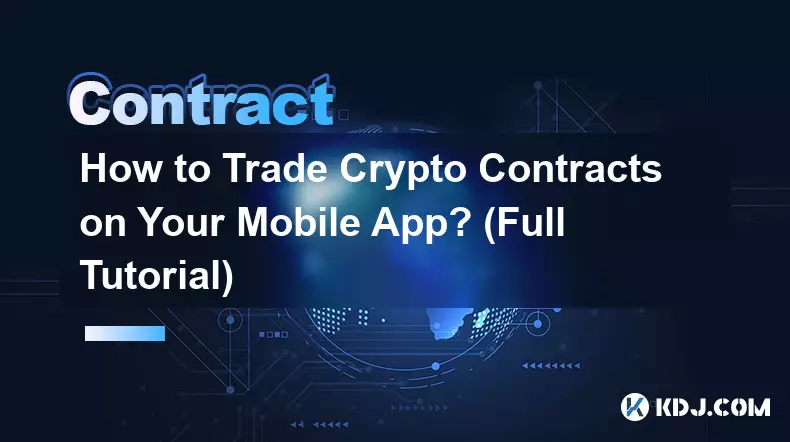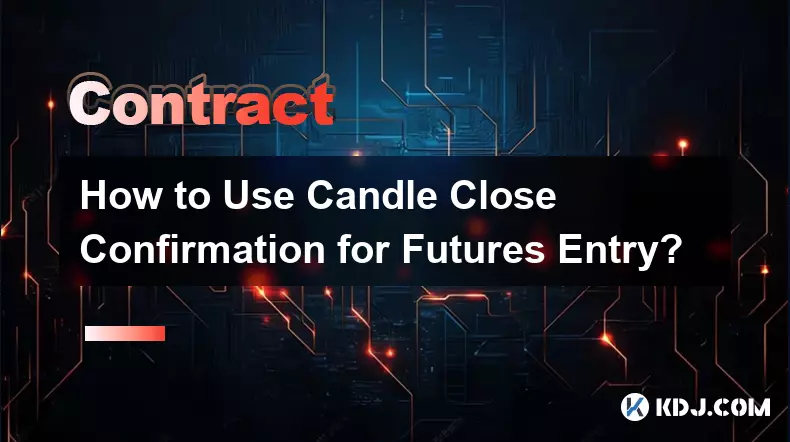-
 bitcoin
bitcoin $87959.907984 USD
1.34% -
 ethereum
ethereum $2920.497338 USD
3.04% -
 tether
tether $0.999775 USD
0.00% -
 xrp
xrp $2.237324 USD
8.12% -
 bnb
bnb $860.243768 USD
0.90% -
 solana
solana $138.089498 USD
5.43% -
 usd-coin
usd-coin $0.999807 USD
0.01% -
 tron
tron $0.272801 USD
-1.53% -
 dogecoin
dogecoin $0.150904 USD
2.96% -
 cardano
cardano $0.421635 USD
1.97% -
 hyperliquid
hyperliquid $32.152445 USD
2.23% -
 bitcoin-cash
bitcoin-cash $533.301069 USD
-1.94% -
 chainlink
chainlink $12.953417 USD
2.68% -
 unus-sed-leo
unus-sed-leo $9.535951 USD
0.73% -
 zcash
zcash $521.483386 USD
-2.87%
What to do when futures contracts expire? Common problems in expiration processing
When futures contracts in crypto expire, traders must prepare by reviewing positions, monitoring market conditions, and addressing common issues like settlement and liquidity problems.
Jun 01, 2025 at 12:14 am

When dealing with futures contracts in the cryptocurrency market, understanding what to do when they expire and handling common problems during expiration processing is crucial. Futures contracts are agreements to buy or sell an asset at a predetermined price at a specified time in the future. In the crypto space, these contracts can involve cryptocurrencies like Bitcoin or Ethereum. As the expiration date approaches, traders need to be well-prepared to manage their positions effectively.
Understanding Futures Contract Expiration
Futures contract expiration is the date on which the contract must be settled, either by physical delivery of the underlying asset or through cash settlement. In the cryptocurrency market, most futures contracts are settled in cash. When a futures contract expires, the difference between the contract's price and the market price of the underlying asset at expiration is settled in the trader's account. It's essential for traders to be aware of the expiration date and understand the settlement process to avoid any surprises.
Preparing for Expiration
Before the expiration of a futures contract, traders should take several steps to ensure a smooth process. Review your positions and decide whether to close them before expiration or let them expire. If you choose to close your positions, you can do so by entering an opposite trade to offset your current position. For example, if you have a long position, you would sell an equivalent amount of the futures contract to close it.
- Check the expiration date of your contracts. This information is usually available on the trading platform where you purchased the contract.
- Monitor market conditions closely as the expiration date approaches. Market volatility can increase, impacting the price at which your contract will settle.
- Set alerts on your trading platform to remind you of the expiration date and any actions you need to take.
Common Problems During Expiration Processing
Several common problems can arise during the expiration processing of futures contracts. Being aware of these issues can help you mitigate risks and manage your positions more effectively.
Settlement Issues
One of the most common problems is settlement issues. If the market price of the underlying asset is significantly different from the contract price at expiration, it can result in a large profit or loss. To avoid unexpected outcomes, ensure that you have sufficient funds in your account to cover any potential losses. Additionally, be aware of the settlement method used by the exchange, as some may use the average price over a period rather than the price at a specific time.
Liquidity Problems
Liquidity problems can also occur, especially in less popular cryptocurrency futures markets. If there is not enough trading volume, it may be difficult to close your position at a favorable price. To mitigate this risk, consider trading more liquid contracts or closing your positions well before the expiration date.
Technical Glitches
Technical glitches on the trading platform can also cause issues during expiration processing. If the platform experiences downtime or errors, it may prevent you from closing your positions or accessing your account. To protect against this, always have a backup plan, such as using multiple trading platforms or having a manual process in place.
Handling Expired Contracts
Once a futures contract has expired, the settlement process begins. If you held your position until expiration, the exchange will automatically settle the contract based on the market price at the time of expiration. Monitor your account to ensure that the settlement is processed correctly and that the funds are credited or debited as expected.
If you encounter any issues with the settlement, contact customer support immediately. Provide them with details of your contract and any discrepancies you have noticed. Most reputable exchanges have dedicated support teams to handle such issues and will work to resolve them promptly.
Strategies for Managing Expiration
To manage the expiration of futures contracts effectively, consider implementing the following strategies:
- Rolling over contracts: If you want to maintain your position beyond the expiration date, you can roll over your contract by closing the expiring contract and opening a new one with a later expiration date.
- Hedging: Use other financial instruments, such as options, to hedge against potential losses from your futures contracts. This can help mitigate the impact of adverse price movements at expiration.
- Diversification: Spread your investments across different assets and expiration dates to reduce the risk associated with any single contract expiring.
Case Studies: Real-World Examples
To illustrate the concepts discussed, let's look at a few real-world examples of futures contract expiration in the cryptocurrency market.
Example 1: Bitcoin Futures
A trader holds a long position in a Bitcoin futures contract with an expiration date of December 31st. As the expiration date approaches, the trader decides to close the position to avoid any potential settlement issues. The trader sells an equivalent amount of the futures contract, effectively closing the position and realizing any profits or losses.
Example 2: Ethereum Futures
Another trader has a short position in an Ethereum futures contract set to expire on January 15th. The trader monitors market conditions and notices increased volatility as the expiration date nears. To mitigate the risk, the trader closes the position a few days before expiration, securing a profit based on the current market price.
Frequently Asked Questions
Q: Can I hold a futures contract past its expiration date?A: No, once a futures contract reaches its expiration date, it must be settled. You can either close your position before expiration or let it expire and be settled by the exchange.
Q: What happens if I forget to close my futures contract before it expires?A: If you forget to close your futures contract before it expires, the exchange will automatically settle the contract based on the market price at expiration. This could result in a profit or loss, depending on the difference between the contract price and the market price.
Q: Are there any fees associated with futures contract expiration?A: Some exchanges may charge fees for settling futures contracts at expiration. It's important to check the fee structure of your trading platform to understand any potential costs.
Q: Can I trade futures contracts with different expiration dates simultaneously?A: Yes, you can trade futures contracts with different expiration dates simultaneously. This can be part of a diversification strategy to manage risk and potentially increase returns.
Disclaimer:info@kdj.com
The information provided is not trading advice. kdj.com does not assume any responsibility for any investments made based on the information provided in this article. Cryptocurrencies are highly volatile and it is highly recommended that you invest with caution after thorough research!
If you believe that the content used on this website infringes your copyright, please contact us immediately (info@kdj.com) and we will delete it promptly.
- Big Apple Bites: While Ethereum Grapples, DeepSnitch AI Whispers of a 1000x Run
- 2026-02-07 06:30:02
- Token cat appointments furong tian to lead audit Amdst Strategic Reshffle
- 2026-02-07 06:40:01
- Brent Key Forges Georgia Tech's "Bully Ball" Identity, Reshaping ACC Competitiveness
- 2026-02-07 07:10:01
- Bithumb's Bitcoin Flash Crash: Billions in Error, Millions in Losses
- 2026-02-07 07:10:01
- Stock Strategy, Market Collapse, and Rebound: Navigating the Bitcoin Rollercoaster
- 2026-02-07 07:05:01
- Metaplanet Faces Mounting Pressure as Bitcoin Dives, CEO Affirms Unwavering Accumulation Strategy
- 2026-02-07 04:15:01
Related knowledge

How to Use Price Action Trading for Crypto Perpetual Contracts?
Feb 06,2026 at 03:20pm
Understanding Price Action Fundamentals1. Price action trading relies entirely on raw market data—candlestick formations, support and resistance level...

How to Trade Crypto Contracts on Your Mobile App? (Full Tutorial)
Feb 07,2026 at 02:59am
Setting Up Your Mobile Trading Environment1. Download the official mobile application from the exchange’s verified website or trusted app store listin...

How to Manage Emotions and "Revenge Trading" in Futures?
Feb 05,2026 at 12:19am
Understanding Emotional Triggers in Futures Markets1. Market volatility directly impacts psychological states, often amplifying fear or euphoria based...

How to Use Candle Close Confirmation for Futures Entry?
Feb 05,2026 at 04:20pm
Understanding Candle Close Confirmation1. A candle close confirmation occurs when the final price of a candlestick settles beyond a predefined level, ...

How to Trade the Funding Fee Arbitrage Strategy? (Passive Income)
Feb 07,2026 at 06:20am
Funding Fee Arbitrage Mechanics1. Funding fees are periodic payments exchanged between long and short traders on perpetual futures exchanges, typicall...

How to Master "Position Sizing" to Prevent Total Account Wipeout?
Feb 06,2026 at 12:00am
Market Volatility Patterns1. Bitcoin price swings often exceed 10% within a 24-hour window during high-liquidity events such as ETF approval announcem...

How to Use Price Action Trading for Crypto Perpetual Contracts?
Feb 06,2026 at 03:20pm
Understanding Price Action Fundamentals1. Price action trading relies entirely on raw market data—candlestick formations, support and resistance level...

How to Trade Crypto Contracts on Your Mobile App? (Full Tutorial)
Feb 07,2026 at 02:59am
Setting Up Your Mobile Trading Environment1. Download the official mobile application from the exchange’s verified website or trusted app store listin...

How to Manage Emotions and "Revenge Trading" in Futures?
Feb 05,2026 at 12:19am
Understanding Emotional Triggers in Futures Markets1. Market volatility directly impacts psychological states, often amplifying fear or euphoria based...

How to Use Candle Close Confirmation for Futures Entry?
Feb 05,2026 at 04:20pm
Understanding Candle Close Confirmation1. A candle close confirmation occurs when the final price of a candlestick settles beyond a predefined level, ...

How to Trade the Funding Fee Arbitrage Strategy? (Passive Income)
Feb 07,2026 at 06:20am
Funding Fee Arbitrage Mechanics1. Funding fees are periodic payments exchanged between long and short traders on perpetual futures exchanges, typicall...

How to Master "Position Sizing" to Prevent Total Account Wipeout?
Feb 06,2026 at 12:00am
Market Volatility Patterns1. Bitcoin price swings often exceed 10% within a 24-hour window during high-liquidity events such as ETF approval announcem...
See all articles










































































